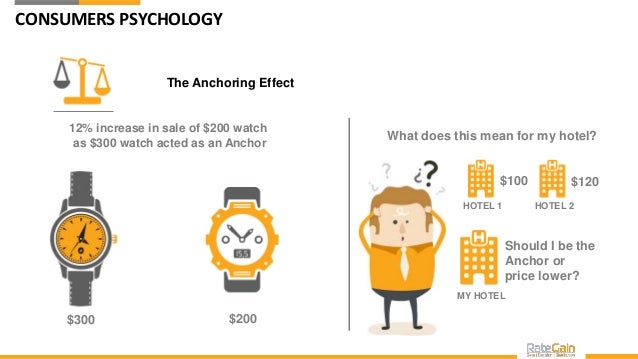

- #The anchoring effect psychology definition how to
- #The anchoring effect psychology definition full
- #The anchoring effect psychology definition trial
If someone tells you an extremely outrageous idea, then later gives you a second idea that is less extreme, the second idea sounds less controversial than if he had presented it to you first. (Shortform note: the idea of anchoring can be taken beyond numbers into ideas. The listing price strongly anchors agents to the bid that they make.


When you’re buying a house, real estate agents claim to be immune to listing prices when negotiating prices for you, when the opposite is true.
#The anchoring effect psychology definition full
But you really don’t have full command of your cognition. Insidiously, people take pride in their supposed immunity to anchored numbers. The Group A mean was 844 feet and the Group B mean was 282 feet.
Did the anchors in the first question affect the estimates given in answer to the second question? Yes. For example, one study asked Group A two questions: 1) Is the tallest redwood taller or shorter than 1,200 feet? and 2) What do you think the height of the tallest redwood is? They asked Group B the same two questions, except the anchor in the first question was 180 feet rather than 1,200 feet. Studies show this index can be over 50%! (A measure of 100% would mean the person in question is not only influenced by the anchor but uses the actual anchor number as their estimate conversely, a measure of 0% would indicate the person has ignored the anchor entirely.) The index is defined as: (the difference between the average guesses when exposed to two different anchors) / (the difference between the two anchors). The anchoring index measures how effective the anchor is. The Anchoring Effect and the Anchoring Index But again even meaningless numbers, even dice rolls, can anchor you. Sometimes, the anchor works because you infer the number is given for a reason, and it’s a reasonable place to adjust from. The wheel of fortune number has nothing to do with African countries in the UN the requested donation size should have little effect on how much you personally want to donate. Note how in several the anchoring effect examples above, the number given is not all that relevant to the question at hand. (Shortform note: this might also be confounded as a signal of demand, indicating quality or scarcity.) Arbitrary rationing, like supermarkets with “limit 12 per person,” makes people buy more cans, compared to when there’s no limit. In online auctions, the Buy Now prices serve as anchors for the final price. When it requested $400, the average donation was $143 when requesting $5, the average donation was $20. A nonprofit requested different amounts of donations in its requests. The average estimates came to 25% and 45%, based on whether they were shown 10 or 65, respectively. The students were then asked to estimate the % of African nations in the UN. The game was rigged to show only the numbers 10 or 65. Students were shown a wheel of fortune game that had numbers on it. The first group, who were asked about age 144, estimated a higher age of death than students who were asked about age 32, with a difference in average guesses of over 15 years. Both groups are then asked to estimate what age Gandhi actually died at. The other group is asked if Gandhi died before or after age 32. One group is asked if Gandhi died before or after age 144. Surprisingly, this happens even when the number has no meaningful relevance to the quantity to be estimated.Įxamples of the Anchoring Effect in Psychology In quantitative terms, when you are exposed to a number, then asked to estimate an unknown quantity, the initial number affects your estimate of the unknown quantity. The Anchoring EffectĪnchoring describes the bias where you depend too heavily on an initial piece of information when making decisions. #The anchoring effect psychology definition how to
Learn how the anchoring effect in psychology works, why it can lead to bias, and how to overcome the anchoring effect. This can lead to bad judgments and allows you to be biased by information that’s often irrelevant to the decision at hand. The anchoring effect is a cognitive bias where you depend too heavily on an initial piece of information when making decisions.

What is the anchoring effect? How do we use it in everyday decision making?
#The anchoring effect psychology definition trial
Like this article? Sign up for a free trial here. Shortform has the world's best summaries of books you should be reading. This article is an excerpt from the Shortform summary of "Thinking, Fast and Slow" by Daniel Kahneman.








 0 kommentar(er)
0 kommentar(er)
